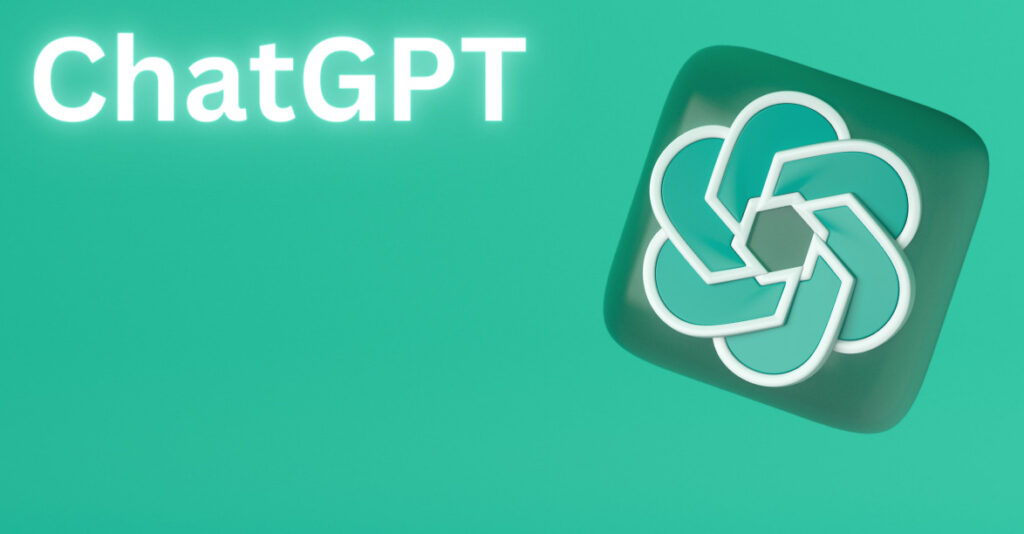Table of Contents
ToggleChatGPT in the Financial Industry - Artificial Intelligence in Banking

Advances in artificial intelligence (AI) have led to groundbreaking developments in various industries, and the financial industry is no exception. Recently, ChatGPT, an automated advisor, has established itself as an important tool in companies. With the ability to answer customer inquiries and offer consulting services, ChatGPT has proven to be a versatile AI solution that offers a wide range of applications in the financial industry.
The rapid spread of ChatGPT in the financial industry is impressive. According to Statista, more than 900 companies are already using ChatGPT successfully, and the number of users is increasing rapidly. Within just five days, over 1 million people have already used ChatGPT. But what makes ChatGPT so valuable in the financial industry? (Status: July 2023)
Generative Artificial Intelligence in the Financial Industry
One of the outstanding features of ChatGPT is its user-friendliness. Through the use of generative AI, complex financial information can be transferred into an understandable language, so that even laypersons can better understand financial experts. As a result, a larger target group is reached, including so-called “Finfluencers”, who play a growing role as opinion leaders in social media.
Information gathering plays a crucial role in the financial industry. Generative AI enables laypersons to obtain relevant information in order to make informed financial decisions. It supports self-deciders and facilitates the understanding of financial issues.
ChatGPT in Investment and Investment Advice
In the area of investment and investment advice, chatbots offer customers the opportunity to make informed decisions. They provide information on investment strategies, risk assessment and portfolio optimization. Through personalized advice based on the individual goals, risk profiles and preferences of customers, they can achieve their financial goals more effectively.
Studies have shown that about half of adult Americans use ChatGPT to select stocks, with 45% of them even relying exclusively on AI. The integration of Explainable AI (XAI) with ChatGPT makes it possible to make decision-making more comprehensible and to strengthen users’ trust in the AI solution.
Also my own study shows that robo-advisors certainly have the potential to sustainably revolutionize the investment landscape in the long term, as they are constantly learning, they are easily accessible for self-investors and are significantly more cost-efficient compared to traditional options such as consulting or portfolio management.
Artificial Intelligence Optimizes both Internally and Externally
Chatbots play a crucial role in optimizing banking processes both internally and externally. With their ability to interact with customers quickly and efficiently, chatbots can take on a variety of tasks, including providing account statements, assisting with payment transactions, processing loan requests, and answering questions about transactions or fees. The 24/7 availability of chatbots allows customers to clarify their concerns promptly and independently of bank opening hours, which leads to an increase in customer satisfaction. In addition, technologies such as ChatGPT offer advanced AI for providing flexible financial solutions for all institutions. The ability to deliver intelligent answers based on aggregated data makes it possible to further improve banking services and provide added value to customers.
These technologies are revolutionizing the way banks interact with their customers, offering numerous benefits for both sides. Here are some current examples of how banks are already using ChatGPT and other AIs today:
The hype surrounding ChatGPT has driven the introduction of proprietary chatbot alternatives in the financial industry. German banks are expanding their AI applications and recognizing the importance of artificial intelligence (AI) for the future success of their companies. However, they not only prohibit programs like ChatGPT, but also develop their own intelligent chatbots. Jamie Dimon, CEO of JP Morgan, emphasized in a shareholder letter the relevance of AI and data for the success of the company. The world’s largest bank plans to use language models such as ChatGPT to support its employees.
Major banks and fintech companies see great potential in generative AI, especially in the field of artificial intelligence. The technology makes it possible to generate content such as texts, images and videos from scratch and has attracted a lot of attention with ChatGPT from OpenAI. At the Fintech conference Money 20/20 in Amsterdam, executives from financial companies praised generative AI as an “innovation explosion” and emphasized its potential benefits in reducing time and money. Banks such as ABN Amro, Goldman Sachs and Morgan Stanley are already testing the use of generative AI for automatic summaries of customer interactions, internal code improvements and information provision for financial advisors. Another application of AI in finance is to support compliance experts in combating crime by being able to detect money laundering and fraud in real time.
Deutsche Bank has entered into a multi-year partnership with graphics processor manufacturer Nvidia to promote the increased use of artificial intelligence (AI) and machine learning (ML) in risk management and lending. The collaboration aims to develop AI-powered and regulatory-compliant services and support the bank’s cloud transformation. Deutsche Bank plans to use AI for better customer service and to detect warning signs in financial transactions at an early stage. Furthermore, AI will be used to automate process steps and accelerate credit checks. The partnership with Nvidia is part of the bank’s strategic transformation to leverage state-of-the-art technologies in the financial services sector.
Volksbank and Sparkasse also want to use AIs to help protect against fraud and to detect cyber attacks at an early stage.
Robo-advisors and the Role of AI in Asset Management
The integration of artificial intelligence into robo-advisor services has reached the next level of individualization. One example of this is the digital asset manager VisualVest, which has integrated ChatGPT, developed by OpenAI, into its customer coach KuCo. Although ChatGPT does not provide direct recommendations, it can provide customers with ideas and strategies related to various topics of investment.
AI also offers enormous advantages in the asset management industry. Through improved sentiment analysis, ChatGPT can recognize the sentiment of a text and thus enable more precise scoring models. The use of AI in the selection of stocks and the optimization of diversification effects have shown that AI portfolios tend to outperform randomly selected stocks.
Overview and Forecasts with AI
Chatbots not only support the management of assets, but also the filtering and analysis of information. They provide real-time information on market developments, portfolio performance and trading opportunities. Through automated processes, chatbots can help monitor and adjust portfolios to achieve optimal results.
But ChatGPT is not the only AI solution in the financial industry. There are a variety of other AI models and platforms such as Sentieo, Kensho, Sigmoidal and AlphaSense, each of which is specialized and helps investors analyze data and identify investment opportunities.




Sentieo also uses AI and machine learning to analyze data, including financial news, public filings, and research reports. Sentieo can be used to identify investment opportunities and assess risks. The tool is primarily aimed at data analysts and portfolio managers.
Kensho is a subsidiary of S&P Global and uses AI to collect and analyze large amounts of data. The AI supports investors in understanding economic impacts on companies and markets and in taking these analyses into account in investment decisions.
Sigmoidal uses AI and machine learning to analyze data and make predictions that can support investment decisions. It also takes into account the impact of events such as political changes or economic crises on the markets. In addition to financial data, Sigmoidal’s AI also supports companies in reducing costs, improving work efficiency and enabling time savings.
AlphaSense uses AI and Natural Language Processing to extract and analyze data from tens of thousands of financial documents and news items. The system can help identify trends in an industry, conduct competitive analyses, and measure market sentiment.
The diverse application possibilities of ChatGPT and other AI models in the financial industry make it possible to increase productivity, optimize customer service and create individual addresses and visualizations. The empathetic nature of AI can also help to better understand customer needs and strengthen customer loyalty.
Test the Functionality of AI - “ACATIS Global Value Total Return: the Human-Machine Combination”
An insightful example of the effectiveness of the human-machine combination in the investment sector is ACATIS Global Value Total Return. This shows how AI is used in company valuation, the prediction of future “winning stocks”, portfolio optimization, the identification of critical text passages and the identification of similar companies. The synergy between human expertise and AI makes it possible to carry out complex financial analyses more quickly and accurately. By supplementing human judgments with the powerful capabilities of AI, investors can make more informed and better investment decisions.
Outlook on the Future
With the rapid development of AI and other technologies, there are promising prospects for the future of the financial industry. The integration of AI into the metaverse, the use of avatars, and the further development of ChatGPT as an automated advisor could have a profound impact on the financial industry.
However, the use of ChatGPT and other AI solutions also brings challenges and risks, such as bias, data protection concerns and possible job losses.
In a SWOT analysis, the strengths, weaknesses, opportunities and risks of chatbots in the financial industry were highlighted. While chatbots can increase customer satisfaction and make information provision more efficient, they also encounter resistance and security concerns.
Strengths
- High scalability
- Improved customer satisfaction
- Efficient information provision
Weaknesses
- Lack of human interaction
- Limited expertise
- Potential security risks
Opportunities
- Automation of routine tasks
- Improved scalability of customer support
- Increased efficiency of operations
Risks
- Data protection and security concerns
- Resistance to AI implementation
- Complexity of financial inquiries
Conclusion
The rapid spread of ChatGPT and other AI solutions in the financial industry offers laypersons the opportunity to better inform themselves about individual financial products and make informed decisions. The user-friendliness and diverse application possibilities of ChatGPT make it possible to communicate complex financial information in an understandable way and to reach a broad target group.
The integration of AI in robo-advisor services and asset management undoubtedly has a transformative effect on the financial industry. Through the use of AI in the selection of stocks and the optimization of diversification effects, robo-advisors can offer higher efficiency and accuracy in the management of investment portfolios. This also enables less experienced investors to benefit from sophisticated investment strategies without having to possess extensive expertise.
In addition, AI-powered chatbots are revolutionizing customer service in the financial industry. As virtual advisors, they can support customers with complex financial questions and provide information on financial products, insurance and legal aspects. The interaction with a chatbot can be discreet and confidential, which can reduce customers’ inhibitions and make it easier for them to access financial advice.
Not only customer service benefits from AI, but also bank processes are optimized through the use of chatbots. Banks use chatbots to enable fast and efficient customer interactions, for example, when providing account statements, supporting payment transactions and answering questions about transactions or fees. The availability around the clock enables customers to clarify their concerns promptly and independently of bank opening hours.
In addition to individual productivity gains, AI-powered solutions are also relevant for compliance with legal requirements. Companies like Fireflies.ai offer AI-based meeting recordings that help capture important content and discussions while meeting compliance guidelines.
The future of AI in the financial industry is promising. With rapid technological advances, AI-powered avatars and chatbots could play an even more profound role by further enhancing the customer experience, streamlining operations, detecting fraud, and gaining business insights through natural language processing.
Despite the impressive benefits of AI, these technologies also bring challenges and risks. Bias in the algorithms, data protection concerns and possible job losses are some of the aspects to consider.
Overall, ChatGPT is an important tool in the financial industry that gives laypersons the opportunity to better inform themselves about individual financial products and make informed decisions. The integration of AI in various areas of the financial industry helps to increase efficiency, improve the customer experience and revolutionize the way financial services are provided. Through the targeted use of AI, laypersons can optimize their financial decisions and better achieve their financial goals.
Fireflies uses AI to record meetings, transcribe them, and capture the most important content. Laypersons can use Fireflies to increase their productivity in everyday business, capture important information, and make meeting results easily comprehensible.
WonderChat is an adaptable AI platform that can be used in various industries. Laypersons can use WonderChat to improve customer service by receiving automated, customer-oriented answers to frequently asked questions.
Kartiv is an AI platform that supports the individual addressing and visualization of information. Laypersons can use Kartiv to gain data-based insights, create visually appealing presentations and thus improve their decision-making.
Lotus Therapist is an AI platform that responds empathetically and functions as an online therapist. Laypersons can use Lotus Therapist to receive emotional support, deal with stress and feel better on a mental level.
FAQ: ChatGPT in the Financial Industry
ChatGPT is an artificial intelligence-based language model from OpenAI. In the financial industry, it is used as an automated advisor to answer customer inquiries, offer consulting services and enable personalized financial advice.
ChatGPT speaks in an understandable language and can translate complex financial topics into simple terms. This allows laypersons to better understand financial experts and make informed decisions about individual financial products.
The integration of AI enables robo-advisor services to be more efficient in managing investment portfolios. By using AI in stock selection and diversification, better investment strategies can be developed based on individual customer goals.
Banks use ChatGPT and AI-powered chatbots to provide their customers with fast and efficient service. Customers can use the chatbot to retrieve information about accounts, transactions, products, and services, as well as perform simple banking transactions such as transfers.
AI enables improved sentiment analysis of financial news and public filings. By analyzing large amounts of data, AI can make accurate predictions about market developments and support the investment process to develop better trading strategies.

